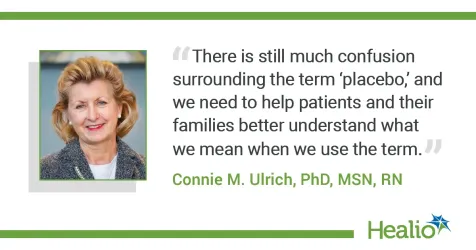by Jennifer Byrne
Patient withdrawal from cancer clinical trials can result in systematic bias, insufficiently powered studies and a loss of valuable scientific knowledge, according to a study in JAMA Network Open.
Although increased attention has been paid to cancer clinical trial recruitment, there has been less focus on factors related to patient retention in these trials, particularly in relation to perceived benefits and burdens.
“I was motivated to study the association between perceived benefit/burden and clinical trial withdrawal for several reasons. First and most importantly, I wanted to hear from patients with cancer,” lead investigator Connie M. Ulrich, PhD, MSN, RN, Lillian S. Brunner chair in medical and surgical nursing, professor of nursing and professor of medical ethics and health policy at Penn Nursing, told Healio. “They have a unique perspective that they can share based on their lived experience, and what researchers or institutional review board members might perceive to be the benefits and burdens of the study being proposed might be very different from the perceptions of individuals who are participating in the clinical trial.”
Ulrich and colleagues at University of Pennsylvania surveyed 334 adults with cancer at an NCI-designated comprehensive cancer center who participated in cancer therapeutic trials. Researchers collected data between September 2015 and June 2019, with data analysis ongoing through October 2022.
 Ulrich spoke with Healio about her study’s findings and how this information might be used to improve clinical trial retention.
Ulrich spoke with Healio about her study’s findings and how this information might be used to improve clinical trial retention.
Healio: Why is it important to understand patient motivations for withdrawing from a cancer clinical trial?
Ulrich: There is still difficulty in recruiting and retaining individuals in clinical trials, which are important for advancing our understanding of new medications, tests and procedures that can provide new ways to treat cancer and lessen the physical, emotional and other effects of cancer on patients.
Healio: Your survey showed two of the three top perceived patient benefits of cancer clinical trials were altruistically motivated (46.3% hoping for a cure, 32.3% helping future patients). Do you find this promising?
Ulrich: It is encouraging that many patients indicated that they participated to help others, even though it might not personally help them. Of course, it is understandable that one would hope for a cure for their disease, and many people participate hoping they will benefit. By helping others, though, it is a way to give back. Knowing that your contribution may pave the way for an innovation in treating a particular type of cancer that has limited treatment options may provide solace.
Healio: Concern about receiving a placebo was the most agreed-upon burden (61.3%) in your survey. Does this suggest that the use of placebo in clinical trials should be reconsidered or handled differently?
Ulrich: No. Placebos are sometimes used if there is no standard of care for the cancer. In these cases, though, it is comparing the standard of care plus a placebo with standard treatment plus the newer drug that is being tested, so the patient is receiving active treatment. What I do think is problematic is that there is still much confusion surrounding the term “placebo,” and we need to help patients and their families better understand what we mean when we use the term and how it is being used in the study.
Healio: Other perceived burdens included having to rearrange one’s life (41.9%) experiencing adverse effects (41.6%), realizing the seriousness of one’s cancer (35.4%) and paying for trial-related expenses (26.9%). How might clinical trial developers mitigate these burdens to encourage retention in clinical trials?
Ulrich: We need to think about how we can provide access to clinical trials to those who, for example, work full time, live in remote geographic areas, might not have immediate transportation to drive to a cancer center for treatment, or might not have the support at home to help with access to a clinical trial or perhaps have other health concerns that alter their ability to drive. During COVID-19, we did a lot with telemedicine, and that might be one way to monitor individuals for adverse effects and provide a way for individuals to avoid traveling distances that might be out of their way and very costly to them.
Paying clinical trial expenses remains a concern. The financial burdens of cancer can be very overwhelming, and we should recognize that as researchers and clinicians. Individual private insurance, Medicare and Medicaid do cover some routine costs associated with participating in a cancer clinical trial, but much more is needed on the policy side to allay financial burdens to patients and their families when they are diagnosed with cancer and volunteer to participate in a clinical trial. These are conversations that patients and their families should have with their researchers and insurance providers so they are clear on what will be covered and what will not.
Healio: “Realizing the seriousness of one’s cancer” was one of the top perceived burdens in your survey. Do patients not yet realize the seriousness of their disease at this point?
Ulrich: Denial or trying not to focus on the seriousness of a cancer diagnosis can be a coping mechanism for some and a way to emotionally prepare oneself for the physical and psychological changes that might follow. Much more work is needed to better understand from patients why they believed that their participation in the clinical trial made them realize the seriousness of their cancer. A percentage of our participants believed that they had no other options than to participate in the clinical trial, and we don’t know whether this was the point that they realized the seriousness of their cancer and when all other standard-of-care treatments for their disease were exhausted without remission or improvement.
Healio: Is there anything else you think would be important to mention?
Ulrich: I would like to reiterate how important it is to hear from patients (and their families), and I thank them for taking the time to help me and my research team better understand their reasons for participating in their clinical trials, even when they were experiencing burdens and not feeling well. In many ways, the focus on risks/burdens has overshadowed the focus on benefits of research participation in clinical trials. We found that patients recognized many benefits of research participation. We now need more dialogue on these benefits and how to reasonably discuss them with potential participants in cancer clinical trials while meeting our ethical and regulatory requirements.
This article was published by Healio.


